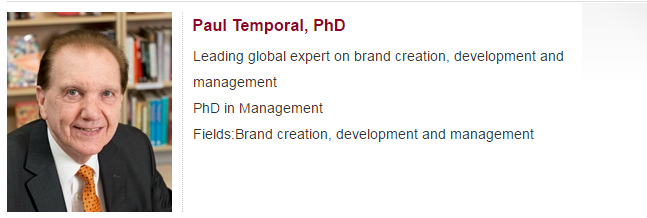China needs to create a national task force to oversee branding efforts throughout the country, according to one of the world's leading experts on the subject.
Last year, China came second in a list of the world's most valued branded countries compiled by India's Economic Times newspaper. Using a complex survey, the country was valued at $6.3 billion, while the US was tops at $19.7 billion.
However, Paul Temporal, a visiting professor at Peking University's HSBC Business School, says branding activities in China are "fragmented", as provinces and companies are all looking to create their own brands.
"Even cities are doing this. Shenzhen, for example, is interested in projecting itself overseas," he says. "It's all happening at different levels, but it needs bringing together."
He suggests setting up a national body to oversee all branding work, similar to what has been done in Singapore and Malaysia.
"The timing is right now because there is so much excitement about brands and branding," says Temporal, who was one of the people behind Malaysia's successful "Truly Asia" tourism marketing campaign.
"One of the things about branding is consistency. Branding isn't just about talking, it's about policies, diplomacy - things have to happen, and getting a consensus across different ministries and government departments can be tricky."
Temporal, who is also a visiting professor at Oxford University's Said Business School, says there is a hunger for knowledge about branding in China.
About 18 months ago, he was invited to address a symposium in Zhengzhou, capital of Henan province, and expected 200 or 300 to turn up. "To my surprise, there were more than 4,000 people," he says. As a result of that meeting, representatives of various companies formed an association, which in turn is spreading the word on the value of branding.
Temporal says there are many examples of companies that are building a business but do not know how to construct a brand to go with it.
"They're very keen to learn and are embracing Western techniques. I'm involved with a lot of companies. They are really eager to absorb these techniques. They have seen Western companies build their brands while they have built the products (for them), and now they want to build their own brands.
"The enthusiasm is overwhelming. They will succeed," he adds. "They have a work ethic, they are willing to put themselves on the spot and get their employees involved in building these brands."
He warns that it will not be done overnight, although he notes that when China decides to do something, it tends to get it done.
"I'm optimistic about the future and the fact that China will have a lot more international brands. It does take time because it's such a big country," he says. "It's a huge task, but if the initiative, the incentives, come from the top, the establishment of what China wants to do in the world, its vision, its values, these kind of things will help people focus at a lower level.
"It doesn't have to be all-encompassing. It's too much for one branding task force to control what's going on. But if it sets the scene, and manages the process, that would be helpful. It has to involve different areas of government. Investment, tourism, trade, all the different areas represented."
By Chris Peterson (China Daily Europe)
















